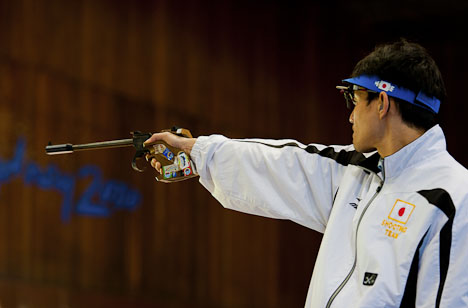They witnessed the natural disaster which wounded their homeland, the last March 11, when one of the greatest earthquake ever registered hit Japan, and had to run and swim to save their lives. Seventeen days later, they decided to share their feelings, while competing at the ISSF World Cup Stage in Sydney.
The shooting team was right there, on the epicenter, when the endless earthquake struck the country. Japan’s National Air Gun Championship, scheduled in those days, was indeed taking place in Ishinomaki, Miyagi prefecture. Exactly atop of the epicenter. Exactly there, where the tsunami hit with its uncontrollable wave of destruction.
There was no escape: all the participants, all the Japanese shooters, experienced the shock and the following tsunami while they were in town for their last preparations, and found themselves at the centre of the disaster.
Moments of terror. Their hotel was swept over by the tsunami. Water and mud everywhere, while they were trapped by the overwhelming power of the elements. All the shooters and their official had to fight to save their lives while the water was changing the landscape around them.
And the aftershock was even worst, some athletes said here in Sydney. Once your life is safe, you start thinking about the others. Then, a dolorous search starts. Incredibly, all athletes were safe, but it took hours and even days to regroup them, and since the telephone lines were crippled after the chaos the Association’s official couldn’t confirm the safety of all shooters for days.
“Every time an aftershock came I was frightened.” rifle shooter Midori Yajima said. “I was wearing the shooting jacket, and I could not move quickly. It was scary.”
Another rifle shooter, Seiko Iwata shared Yajima’s comments. “After the earthquake, we had an issue with gasoline shortage so we couldn’t move around as we want. My training was restricted by that.”
When finally the telephones started working again, the good news came: all the shooters of the national team were alive.
In spite of the shock and of the difficult situation, the majority of them went back to their hometowns within the next few days. And, with a typical Japanese self-control, they soon resumed their preparation for the 2011 ISSF World Cup in Sydney.
But how should someone train, in such a situation? Where can you find the mental power to file such an event, and to go back to your normal training routine? Japan’s clay target team withdrew its participation in the World Cup. And only five courageous Rifle and Pistol shooters, including the two-time Pistol World Champion Tomoyuki Matsuda, decided to come to Sydney.
As a police officer from Kanagawa Prefectural Police, Matsuda admitted that he once considered withdrawal from the Cup. His practice schedule was messed up and he had to come down to Sydney without enough training. The reigning world champion confessed that the last time he practiced at 50-meter range had been at the end of February. And, even if he did not talked about that, we can imagine the stress on his shoulders, after the disaster.
Matsuda, who had been elected “2010 Shooter of the Year” just a few months ago, competed fiercely and managed to clinch the title in the Men’s 10m Air Pistol on Thursday, 24 March, without having his coach, Emil Dushanov, on his side. Dushanov, a Bulgarian pistol coach, decided indeed to leaver Japan after the earthquake, to go back to his home town Sophia.
The Japanese marksman added another Gold to his medal tally at the World Cup by winning the Men’s 50m Pistol on Sunday, 27 March.
“I think I gained positive momentum from the earthquakes.” The Japanese shooter said, stepping on the podium without a smile. “There are people who are forced to have tougher life than I do. I left my family in Japan to come here, and I had to achieve the result.”
“The pressure was high. I felt the responsibility to perform well. I guess the results came from the responsibility I was feeling,” said Matsuda, who dedicated his two victories to his wounded homeland.
“Japan has received a lot of supports including fund-raise from people all over the world. As a representative of Japan shooting, I would like to express my sincere gratitude for the supports. Everyone here also asked me if I was okay while I was in Japan. I was touched by them.”
The Japanese shooter said then that he would be competing at the next ISSF World Cup Stage in Korea, starting the sixth of April. “My family is safe, I have to think about the competitions. I really hope that my victories can somehow help the people of Japan.” Once again, a prove of the mental power of this extraordinary athlete.

